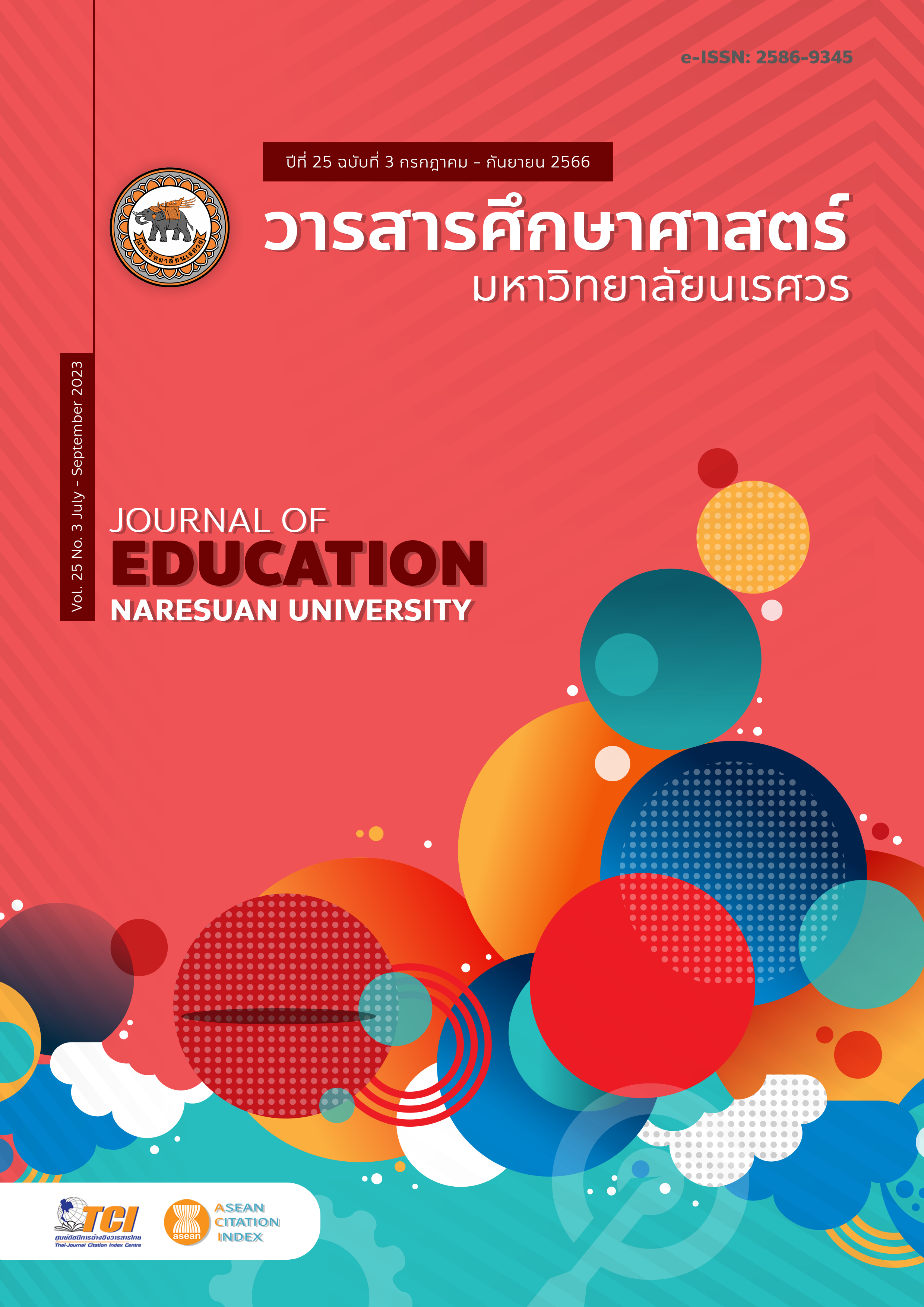THE EFFECTS OF LOOSE PARTS PLAY ACTIVITY PROVISION ON FLEXIBLE THINKING SKILL OF YOUNG CHILDREN ผลของการจัดกิจกรรมการเล่นสื่อวัสดุปลายเปิดที่มีต่อทักษะการคิดยืดหยุ่นของเด็กปฐมวัย
Main Article Content
Abstract
The objective of this research was to change flexible thinking of young children who received loose parts play activities. The target group in the research were 16 male and female children between 5-6 years old studying in kindergarten level 3, Wat Kok Cha La School under Private Education Committee. The tools used in the research were 24 plans of loose parts play activity consisting of 4 steps: step 1 creating interest, step 2 creating situation, step 3 activity operation and step 4 conclusion and behavior observation form of flexible thinking of young children. Quantitative data were analyzed by statistical data. frequency, means, standard deviation and qualitative data analysis were acquired content analysis and descriptive narration. From the research, it was found that young children who received loose parts play activities for flexible thinking in Phase were 3 higher than Phase 1 and Phase 2. The aspect with the most change was the aspect of changing role in conducting activity with friends and then it was the aspect of exchanging opinion with adults, the aspect of participation in solving conflict and the aspect of changing activity and methodology to suit situations.
Article Details

This work is licensed under a Creative Commons Attribution-NonCommercial-NoDerivatives 4.0 International License.
The owner of the article does not copy or violate any of its copyright. If any copyright infringement occurs or prosecution, in any case, the Editorial Board is not involved in all the rights to the owner of the article to be performed.
References
Boonkerd, P., Piyaaudchariya, L., Apinuntaporn, N., & Prasert, A. (2015). Brain-based learning: BBL. Bangkok: Office of Knowledge Management and Development (Public Organization). [in Thai]
Caruana & Daniela. (2013). Learning through landscapes: Promoting out-of-class teaching and learning. Retrieved from https://www.um.edu.mt/library/oar/handle/123456789/9282
Casey, T., & Robertson, J. (2019). Loose parts play: A toolkit. Edinburgh: Inspirihg Scotland.
Chutabhakdikul, N., Thanasetkorn, P., Lertawasdatrakul, O., & Ruksee, N. (2017). Tool development and evaluation criteria for assessment of executive function in early childhood. Bangkok: Mahidol University. [in Thai]
Daly, L., & Beloglovsk, M. (2015). Loose parts: Inspiring play in young children. St. Paul, MN: Redefeat Press.
Isquith, P. K., & Gioia, G. A. (2008). Behavior rating inventory of executive function BRIEF interpretive report. Retrieved from https://www.acer.edu.au/documents/sample_reports/brief-interpretive.pdf
Gibson, J. L., Cornell, M., & Gill, T. (2017). A Systematic review of research into the impact of loose parts play on children’s cognitive, social and emotional development. School Mental Health, 9(4). https://doi.org/10.1007/s12310-017-9220-9
Gioia, G. A., Isquith, P. K., Guy, S. C., & Kenworthy, L. (2000). Professional manual behavior rating inventory of executive function. Florida: PAR.
Harnmethee. (2018). Brain skills development manual ef executive functions for early childhood teachers (4th ed.). Bangkok.: Matichon Public Company. [in Thai]
Jatisathien, C., Meesasan, K., & Chaikarn, A. (2017). Early childhood development. Holistically Bangkok: Plus Press. [in Thai]
Kajornsin, B. (2005). Analysis and interpretation of research data by using software packages. Bangkok: Kasetsart University. [in Thai]
Keawkungvel, S. (1997). Psychology of life at all ages. Bangkok: Thammasat University. [in Thai]
Mincemoyer, C. C. (2016). Loose parts: What does this mean? Retrieved September 18, 2020, from https://drive.google.com/file/d/1K3cib3fkmx RnjcveurN6_XpqXFydMuQS/view
Office of the Prime Minister. (2017). Twelfth National Economic and Social Development Plan 2017-2021. Bangkok: Office of the National Economic and Social Development Board. [in Thai]
Philosophy for Children New Zealand. (2020). About P4C. Retrieved September 24, 2020, from http://www.p4c.org.nz/about
Scott, L. M. (2019). 21st Century Learning for Early Childhood. Retrieved from https://www.battelleforkids.org/networks/p21
Susaorat, P. (2013). Thinking development. Bangkok: 9119 Technic Printing LP. [in Thai]
Songsang, J. (2007). The effect of integrative art activity on problem solving of young children (Master thesis). Bangkok: Srinakharinwirot University. [in Thai]
Weisberg. D. S., Hirsh-Pasek, K., Golinkoff, R. M., Kittredge, A. K., & Klahr, D. (2016). Guided play: Principles and Practices. Current Directions in Psychological Science, 25(3), 177-182.
Wilson, P. (2009). Play work primer. NY: Alliance for Childhood.


